Business applications work best when they communicate seamlessly, eliminating data silos and manual processes that slow down operations. NetSuite integrations and integrators connect your enterprise resource planning (ERP) system with other essential business tools. By automating workflows, they speed up processes and reduce errors across departments, helping businesses like Nation Safe Drivers save 30 hours each month.
This comprehensive guide explores the top NetSuite integrations and integrators—a mix of integration platforms, standalone tools, and business applications that connect directly to NetSuite. From accounting automation to e-commerce synchronization, these solutions can help you streamline operations and improve efficiency across your business.
What are NetSuite integrations and integrators and how do they work?
NetSuite integrations are the connections that link your NetSuite ERP system with other business applications, enabling automatic data synchronization and workflow automation. These integrations allow information to move seamlessly between systems without manual intervention so your team can work more efficiently and accurately.
NetSuite integrators, on the other hand, are platforms and tools that build and manage connections between platforms. They use application programming interfaces (APIs), prebuilt connectors, or middleware to configure and maintain data flows between systems.
For example, an integration might sync your e-commerce platform with NetSuite to automatically create sales orders, update inventory, and trigger fulfillment. The integrator is the solution (one like SuperSync) that makes that integration possible.
Most modern integrations, managed through integrators, support both one-way and two-way data flows, ensuring that information stays current across all connected systems.
Benefits of integrating NetSuite
NetSuite integrations can transform your business by eliminating data silos and connecting all your applications into one seamless ecosystem. This unified approach streamlines operations and empowers your team to work smarter. You’ll see benefits like:
- Workflow automation: Reduce manual data entry and free up hours for your accounting team each week.
- Better decision-making: Gain real-time visibility into financials, inventory, and customer interactions to support strategic planning.
- Higher accuracy: Automated data syncing eliminates errors caused by manual processes.
- Easier communication: Ensure every department works from the same data source, improving alignment and reducing confusion.
Best NetSuite integrations and integrators
The following NetSuite integrations are some of the most popular solutions for businesses, covering everything from accounting automation to e-commerce synchronization.
1. SuperSync Integrations by Netgain
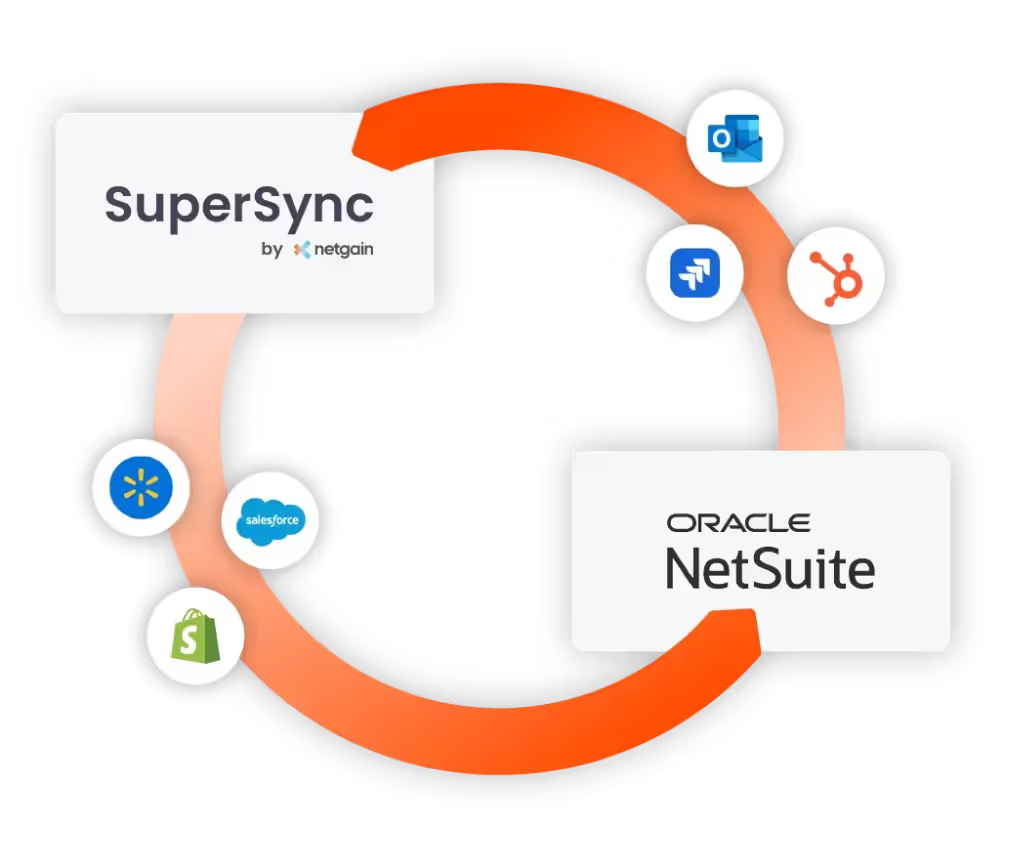
SuperSync Integrations is Netgain’s integration middleware software to seamlessly connect NetSuite with e-commerce, CRM, logistics, and other business platforms. For example, SuperSync can connect your accounting software with Shopify, Amazon, and Salesforce, for a sleek, unified tech stack.
Built by experienced accountants, SuperSync automates financial data synchronization, streamlines workflows, and reduces reliance on manual data entry. With secure, real-time data flows, businesses can keep all their connected systems aligned.
Key features:
- Integration options: Connect NetSuite with 200+ applications, including Shopify, Amazon, and logistics providers.
- Centralized reporting: Ensure accurate, up-to-date financials with consolidated data from multiple channels.
- Simplified reporting: Generate comprehensive reports from NetSuite by aggregating all your connected systems.
- Automated workflows: Create cross-platform automated workflows for accurate data and efficient processes.
- Fast system connection: See results fast with streamlined implementation and pre-built connectors for popular platforms.
Pricing: SuperSync by Netgain offers multiple packages depending on your specific needs.
Schedule a demo today to learn how SuperSync can simplify and accelerate month-end close, reconciliations, and more.
2. NetSuite Connector (formerly FarApp)
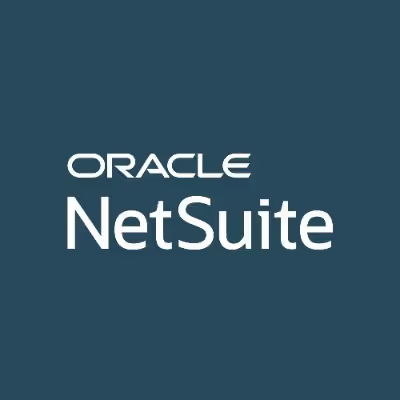
NetSuite Connector is an integrator that enables two-way data synchronization between NetSuite and various external systems, including ecommerce platforms, marketplaces, CRMs, logistics providers, and point-of-sale (POS) systems. It conducts low load/low volume integrations for budget conscious companies.
Key features:
- Connect to other systems: Deploy prebuilt integrations for platforms such as Shopify, Amazon, and Salesforce without custom development.
- Centralize financials and reporting: Keep NetSuite ERP as the single source of truth across ecommerce, CRM, and logistics systems.
- Automate processes: Remove manual order entry, inventory updates, and refund handling through automated workflows.
- Maintain data consistency: Update, add, or remove records across connected platforms to prevent discrepancies and duplicate data.
- Support multi-channel workflows: Manage transactions and data flows from ecommerce sites, marketplaces, and physical point-of-sale systems.
Pricing: NetSuite Connector is available as an add-on module to NetSuite. Licensing includes an annual fee based on the number of users, core platform access, and selected modules.
3. Blackline

BlackLine provides finance and accounting automation software that integrates with NetSuite for reconciliation, close, intercompany, and reporting processes. It offers centralized transaction matching, task management, and journal entry validation. BlackLine aims to bring control to high-volume financial operations.
Key features:
- Automated transaction matching: Process high volumes of transactions using reconciliation rules and a dedicated matching engine.
- Template-based reconciliations: Apply standardized templates aligned to account types to reduce setup time.
- Integrated task management: Link close tasks with workflows, dependencies, and supporting documentation.
- Flexible data integration: Connect to NetSuite and other systems through prebuilt connectors and APIs.
- Centralized change management: Adjust to reorganizations and acquisitions within a single administrative framework.
Pricing: BlackLine’s pricing is based on the selected features and number of users.
4. Floqast
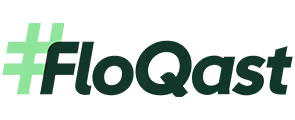
FloQast integrates with Oracle NetSuite to automate account reconciliations and manage the month-end close process. The system connects to NetSuite transactions and Excel-based workpapers to carry out tie-outs and identify variances.
Key features:
- Automated reconciliation management: Sync with NetSuite to reconcile accounts, including bank balances, credit cards, deferred revenue, and accruals.
- Variance alerts post sign-off: Notify users of account balance changes after reconciliation approvals.
- Checklist-based close tracking: Import month-end close checklists to centralize task tracking and prevent missed steps.
- Excel integration: Use Excel for account tie-outs while maintaining a NetSuite system of record for audits and compliance.
- Simple implementation: Launch within weeks using standard checklists and cloud storage for NetSuite integration.
Pricing: FloQast offers subscription-based pricing tailored to organization size and product scope.
5. Ramp

Ramp is a finance automation platform that serves as a NetSuite integrator, connecting expense management, bill payments, and corporate card transactions directly into NetSuite. It helps businesses streamline financial operations by automating data syncs, reducing manual entry, and accelerating the month-end close process.
Key features:
- One-click setup: Connect Ramp to NetSuite with no coding required.
- Automated syncing: Push expenses, reimbursements, and vendor payments directly into NetSuite.
- Multi-entity support: Handle subsidiaries, currencies, and complex accounting structures.
- Chart of Accounts integration: Import accounts, custom fields, and segments for accurate mapping.
- Smart rules & approvals: Automate coding, workflows, and multi-step approvals.
- Fast bill pay: Pay vendors via card, ACH, or check with seamless NetSuite syncing.
- Stronger controls: Improve reconciliation, compliance, and audit readiness.
Pricing:
- Free
- Plus: $15/mo/user
Enterprise: Custom pricing
6. Workiva

Workiva connects to NetSuite using Token Authentication and Java database connectivity (JDBC) to automate the retrieval and management of financial and inventory data. These integrations allow users to query NetSuite records, saved searches, and files directly from the Workiva platform.
Key features:
- Token-based authentication: Connect securely to NetSuite using token-based credentials without relying on user logins.
- JDBC connector support: Execute structured query language (SQL) queries within NetSuite to extract data for analysis and reporting.
- Automated data retrieval: Pull records, files, and saved search results automatically from NetSuite to streamline workflows.
- Inventory and financial data access: Retrieve up-to-date inventory and financial records for reporting and planning.
- Query-based integration: Run custom queries against NetSuite to extract only the relevant data needed for business operations.
Pricing: Subscription prices not publicly available.
7. Xero
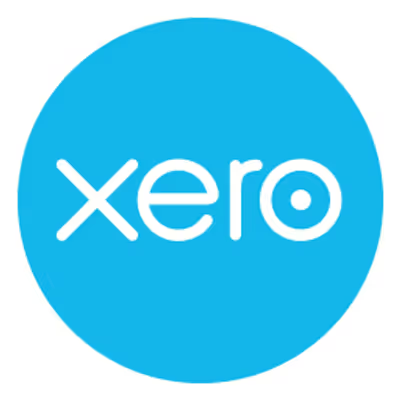
Xero integrates with NetSuite using third-party tools such as Celigo or Zapier to synchronize financial data and automate workflows. As accounting software, you can connect Xero’s general ledger (GL) entries, payroll data, and time tracking to improve consistency. Workforce Management (WFM) integrations with Xero also support employee record syncing and shift export.
Key features:
- Third-party platform support: Enable integration with NetSuite through tools such as Celigo and Zapier for automated data transfer.
- Employee synchronization: Automatically sync employee records and update personal information between WFM and Xero.
- Time tracking exports: Export worked hours and shifts from WFM to Xero for payroll processing.
- Bidirectional employee creation: Create employee records in either WFM or Xero and sync them across both systems.
- Manual update support: Update WFM employee details manually using data pulled from Xero when required.
Pricing:
- Starter: $29/month
- Standard: $46/month
- Premium: $69/month
8. Celigo

Celigo is an integration platform-as-a-service (iPaaS) that connects NetSuite with accounting, ERP, and sales applications. It provides prebuilt connectors, error-handling capabilities, and an interface for IT and finance teams managing integrations. Customers generally need an internal IT management platform or third party support for effective Celigo integration.
Key features:
- Prebuilt NetSuite connectors: Provide over 80 prebuilt integrations with applications such as Salesforce, Shopify, Amazon, HubSpot, and 3PL providers.
- Process automation templates: Automate common workflows, including quote-to-cash, procure-to-pay, and expense management.
- AI-powered error handling: Detect and resolve integration errors automatically to reduce manual intervention.
- Enterprise-grade security: Comply with global standards such as General Data Protection Regulation (GDPR) and Systems and Organizations Controls 2 (SOC 2) to ensure secure and compliant data flows.
- User-configurable platform: Allow business users to build, deploy, and monitor integrations without heavy reliance on developers.
Pricing: Celigo uses flat-rate pricing based on the number of endpoints and flows, rather than charging per task or transaction.
9. Boomi
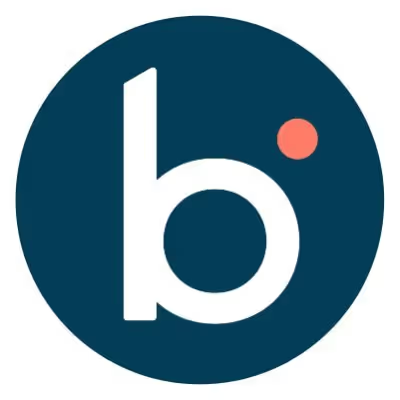
Boomi is an iPaas integration platform that connects NetSuite with cloud and on-premises applications across sales, operations, and finance. Boomi allows businesses to synchronize customer, product, and financial data across systems. The platform is generally used in the enterprise space due to high costs and cumbersome implementation.
Key features:
- Low-code integration tools: Implement NetSuite integrations using a drag-and-drop interface.
- Prebuilt connector library: Provide ready-made integrations for Salesforce, Shopify, WooCommerce, Azure, BigCommerce, and more.
- Multi-platform connectivity: Link NetSuite with cloud, SaaS, and on-premises systems to unify business operations.
- Unified data management: Align data across customer, inventory, and financial systems to improve reporting and process consistency.
- Support for enterprise scale: Manage integration environments across departments and regions for organizations of all sizes.
Pricing: Boomi offers tiered pricing based on the number of connectors, data flows, and support levels.
10. Tipalti
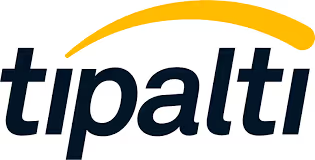
Tipalti integrates with NetSuite to automate accounts payable (AP) operations, manage global supplier payments, and process invoices. It synchronizes payables data with NetSuite and NetSuite OneWorld, reducing manual reconciliation work and accelerating closes. The platform also includes global payment processing, procurement, tax compliance, and self-service supplier onboarding capabilities.
Key features:
- Real-time reconciliation: Sync payables data with NetSuite sub-ledgers to automate reconciliation and general ledger reporting without spreadsheet imports or exports.
- Global supplier payments: Process payouts in 120 currencies across 200+ countries through 50+ payment methods, including automated clearing house (ACH), wire transfers, PayPal, and checks.
- Multi-entity AP management: Manage payables workflows across subsidiaries and brands using entity-based data segregation and consolidated reporting.
- Self-service supplier portal: Onboard suppliers through a multi-language portal with real-time tax form collection and integrated compliance checks.
- Automated invoice processing: Capture invoice data with optical character recognition (OCR) and machine learning, match purchase orders, and route approvals according to business rules.
Pricing: Tipalti offers annual subscription pricing based on feature selection, entity count, and transaction volume.
11. Shopify

Shopify and Shopify Plus integrations with NetSuite automate data synchronization between storefronts, point-of-sale (POS) systems, and NetSuite ERP. These integrations automate the transfer of orders, inventory levels, product data, and fulfillment status to eliminate manual processes and reduce errors. Businesses can choose from multiple integration apps offering both standard and real-time syncing capabilities, with support for B2C, B2B, and in-store workflows.
Key features:
- Bidirectional data sync: Automatically sync orders, inventory, pricing, customer data, and fulfillment details between NetSuite and Shopify.
- Real-time inventory management: Maintain accurate inventory levels across multiple warehouses and Shopify channels with live updates.
- Accounting automation: Post invoices, manage payments, and synchronize transaction records between systems.
- B2B support: Sync B2B orders, standalone customer records, and manage invoice posting and payment handling.
- POS integration: Connect Shopify POS systems for unified order and fulfillment tracking alongside ecommerce operations.
Pricing:
- Basic: £19/month
- Grow: £49/month
- Advanced: £259/month
- Plus: $2,300/month
All Shopify pricing comes with an additional charge for each card purchase.
12. Amazon Seller Central

Combining Amazon Seller Central with NetSuite automates order-to-cash workflows across fulfillment models, including Merchant Fulfilled Network (MFN), Fulfillment by Amazon (FBA), and Seller Fulfilled Prime (SFP). This integration enables real-time synchronization of orders, inventory, pricing, and settlement data between Amazon and NetSuite. Businesses can also reconcile Amazon settlement reports directly in NetSuite and manage multichannel fulfillment from a single system.
Key features:
- Order and customer sync: Automatically import Amazon orders and customer data into NetSuite, including cancellations and local selling orders.
- Product and pricing management: Sync item details, images, and pricing from NetSuite to Amazon with support for all NetSuite item types.
- Inventory updates: Manage stock across multiple warehouse locations and update inventory levels in Amazon based on NetSuite data.
- Settlement reconciliation: Import settlement reports to reconcile payments, create journal entries, and manage refund workflows.
- Add-on functionality: Combine Amazon FBA inbound shipments, FBA returns, multi-channel fulfillment, and support for multiple Amazon accounts.
Pricing: Pricing for the Amazon integration varies based on core functionality and selected add-ons.
13. WooCommerce

The WooCommerce-NetSuite integration plugin syncs data in both directions between the ecommerce platform and NetSuite ERP. The integration covers customer, order, inventory, refund, and fulfillment data, helping businesses centralize operations and maintain consistency across systems. Inventory levels, pricing, and customer data update automatically based on configurable sync rules and NetSuite fields.
Key features:
- Inventory and pricing sync: Import stock levels and pricing from selected NetSuite locations and price levels into WooCommerce with support for custom matching fields.
- Customer data synchronization: Sync customer profiles on creation and update, with options to classify customers by role or as individuals vs. companies.
- Order management: Connect orders from WooCommerce to NetSuite, with configuration for status-based syncing, shipping cost handling, and location assignment.
- Refund handling: Enable two-way refund synchronization between WooCommerce and NetSuite according to operational needs.
- Fulfillment updates: Sync fulfillment from NetSuite to WooCommerce, mark orders complete, and send tracking emails with courier and pickup date details.
Pricing: WooCommerce pricing depends on the number of add-ons you use in your online store.
14. Salesforce
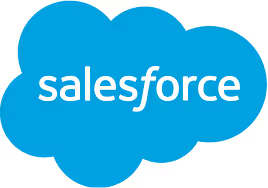
A Salesforce integration gives NetSuite users bi-directional data synchronization between Salesforce CRM and NetSuite ERP. Built on Oracle Integration Cloud, the connector streamlines an organization’s financial, customer, item, and order management processes across platforms. The integration is designed to reduce data silos and support faster, more informed decision-making without relying on third-party tools.
Key features:
- Financial data sync: Provide real-time visibility into NetSuite financials, including invoices, payments, credit limits, and balances, directly within Salesforce.
- Customer record alignment: Keep customer profiles accurate and up to date across both systems by automating updates.
- Product data synchronization: Sync inventory, non-inventory, and service items, along with pricing details, between platforms.
- Sales order integration: Automatically sync sales orders across systems to improve record accuracy and opportunity tracking.
- Self-service integration management: Use Oracle Integration Cloud to set up, monitor, and manage data flows through a NetSuite interface.
Pricing: NetSuite Connector for Salesforce is available through Oracle and priced as an add-on module. Pricing depends on usage volume and Oracle Integration Cloud licensing structure.
15. ShipStation

The ShipStation integration with NetSuite connects order and fulfillment data between NetSuite ERP and shipping operations. By automating workflows across sales channels, third-party logistics (3PLs), and fulfillment providers, the integration cuts manual data entry and improves visibility into shipping status and inventory. It sets NetSuite as the centralized system for managing orders, while ShipStation facilitates fulfillment execution and returns tracking.
Key features:
- Inventory synchronization: Track inventory levels across multiple locations, define reorder points, and perform cycle counts directly in NetSuite.
- Automated order transfer: Export orders from NetSuite to ShipStation, including customer records, taxes, discounts, shipping methods, and item data.
- Fulfillment data sync: Import fulfillment information from ShipStation into NetSuite, including carrier, tracking number, and shipping cost details.
- Multichannel commerce support: Connect NetSuite with ecommerce platforms (e.g., Shopify, Magento, Amazon, eBay) and sync unified order data with ShipStation for fulfillment.
- 3PL and partial fulfillment handling: Support full and partial shipments, order cancellations, and complex workflows across vendors and third-party logistics providers.
Pricing: ShipStation pricing offers tiered pricing based on shipment volume and number of users.
16. HubSpot
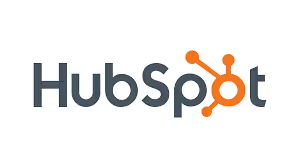
The HubSpot–NetSuite integration shares customer, contact, and opportunity data to support unified sales, marketing, and finance operations. The integration allows teams to automate updates between platforms, create NetSuite sales orders from HubSpot, and embed HubSpot CRM features within NetSuite.
Key features:
- Two-way data sync: Synchronize NetSuite contacts, customers, opportunities, items, and invoices with HubSpot records, including contacts, companies, deals, and products.
- Sales order creation: Generate NetSuite sales orders from HubSpot workflows or directly within deal records for simpler handoffs between sales and finance.
- CRM embedded in NetSuite: View and engage with HubSpot contact and deal data from within NetSuite, including access to workflows and automations.
- Marketing and revenue alignment: Push closed-won opportunity data from NetSuite to HubSpot to attribute revenue to marketing campaigns and create segmentation.
- Customizable sync settings: Select which records to sync across systems to align with business workflows and data governance practices.
Pricing:
- Small: $45/month
- Medium: $270/month
- Large: $900/month
17. Jitterbit

Jitterbit is an integration platform (iPaaS) that acts as a NetSuite integrator, enabling businesses to connect NetSuite with a wide range of applications, databases, and APIs. It helps organizations streamline processes by automating data flows, reducing manual work, and supporting complex enterprise integrations.
Key features:
- Prebuilt connectors: Use ready-made NetSuite connectors to speed up implementation.
- Flexible integration options: Connect NetSuite with cloud apps, on-premise systems, and APIs.
- Low-code design tools: Build, manage, and customize integrations without heavy development work.
- Real-time & batch processing: Choose between instant updates or scheduled data syncs.
- Scalable architecture: Support large volumes of data and enterprise-grade integrations.
- API management: Create, publish, and manage APIs to extend NetSuite’s reach.
- Workflow automation: Streamline end-to-end processes across finance, sales, and operations.
Pricing: Pricing for plans not publicly available.
Choose the best NetSuite integration to maximize your enterprise success
Choosing the proper NetSuite integration isn’t just about checking boxes—it’s about finding a solution that streamlines workflows, reduces manual effort, and scales with your business. The right tool can significantly reduce your month-end close time, boost accuracy, and give your team more headspace for strategic initiatives.
Netgain’s SuperSync offers seamless, plug-and-play integration that eliminates data silos without the need for heavy IT resources. With robust automation, real-time syncing, and industry-leading support, SuperSync empowers your accounting team to work smarter, not harder.
Schedule a demo today to see how SuperSync can transform your NetSuite experience.
Learn more about NetSuite integration
How do I integrate NetSuite with my tech stack?
You can integrate NetSuite with your tech stack through three main approaches:
- Using pre-built connectors like NetSuite Connector for standard applications
- Developing custom integrations with SuiteTalk REST or SOAP APIs for specific requirements
- Implementing a middleware integration platform (iPaaS) for complex multi-system scenarios.
Additionally, SuiteCloud supports standards-based integration, including REST, comma-separated values (CSV), open database connectivity (ODBC), and .NET, giving you multiple options for data exchange. The best choice depends on your technical resources, budget constraints, and specific integration requirements.
How long does it take to integrate NetSuite?
Integration timelines vary significantly based on complexity, ranging from a few days for simple pre-built connectors to several months for complex custom integrations involving multiple systems and extensive data transformation. Proper planning, clear requirements definition, and experienced implementation partners can significantly reduce deployment time and ensure successful outcomes.
How much do NetSuite integrations cost?
NetSuite integration costs range from a few hundred dollars per month for basic pre-built connectors to tens of thousands of dollars for enterprise-grade integration platforms or custom development projects. Businesses should consider both upfront implementation costs and ongoing maintenance expenses, including subscription fees, transaction costs, and support requirements, when budgeting for integration projects.





.avif)